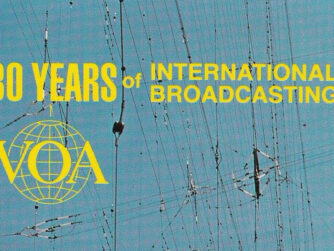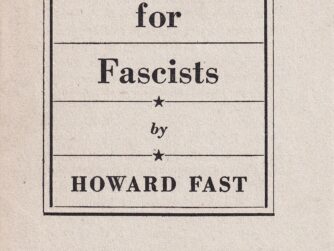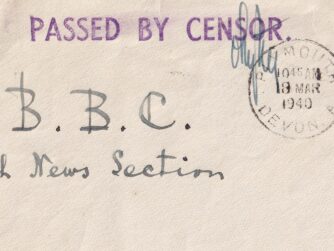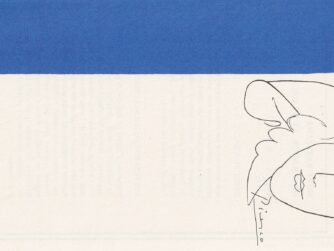By Ted Lipien for Cold War Radio Museum
Soviet influence at Voice of America during World War II — documents and analysis
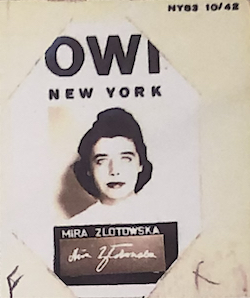
Soviet influence at WWII Voice of America
From VOA to communist regime journalist
Choices of VOA’s pro-Soviet journalist
VOA journalist marries Communists
A pro-Soviet propagandist at OWI and VOA
VOA communist partner Stefan Arski
Pro-Soviet collaborators at OWI and VOA
A VOA friend of Stalin Peace Prize winner
Among Soviet sympathizers at VOA
Critics of her communist influence at VOA
Was she VOA’s communist ‘Mata Hari’?
Mira Złotowska, later known as Mira Michałowska who published books and articles in English as Mira Michal and used several other pen names, was one of many radically left-wing journalists who during World War II worked in New York on Voice of America (VOA) U.S. government anti-Nazi radio broadcasts but also helping to spread Soviet propaganda and censoring news about Stalin’s atrocities. While not the most important among pro-Soviet propagandists at the Voice of America during the war, Michałowska later went back to Poland, married a high-level communist diplomat and for many years supported the regime in Warsaw with soft propaganda in the West while also helping to expose Polish readers to American culture through her magazine articles and translations of American authors. One of the American writers she translated was her former VOA colleague and friend, the 1953 Stalin Peace Prize winner Howard Fast who in 1943 played an important role as VOA’s chief news writer. Despite today’s Russian attempts to undermine journalism with disinformation, the Voice of America has never officially acknowledged its mistakes in allowing pro-Soviet propagandists to take control of its programs for several years during World War II. Eventually, under pressure from congressional and other critics, the Voice of America was reformed in the early 1950s and made a contribution to the fall of communism in East-Central Europe.
Adolf Hoffmeister
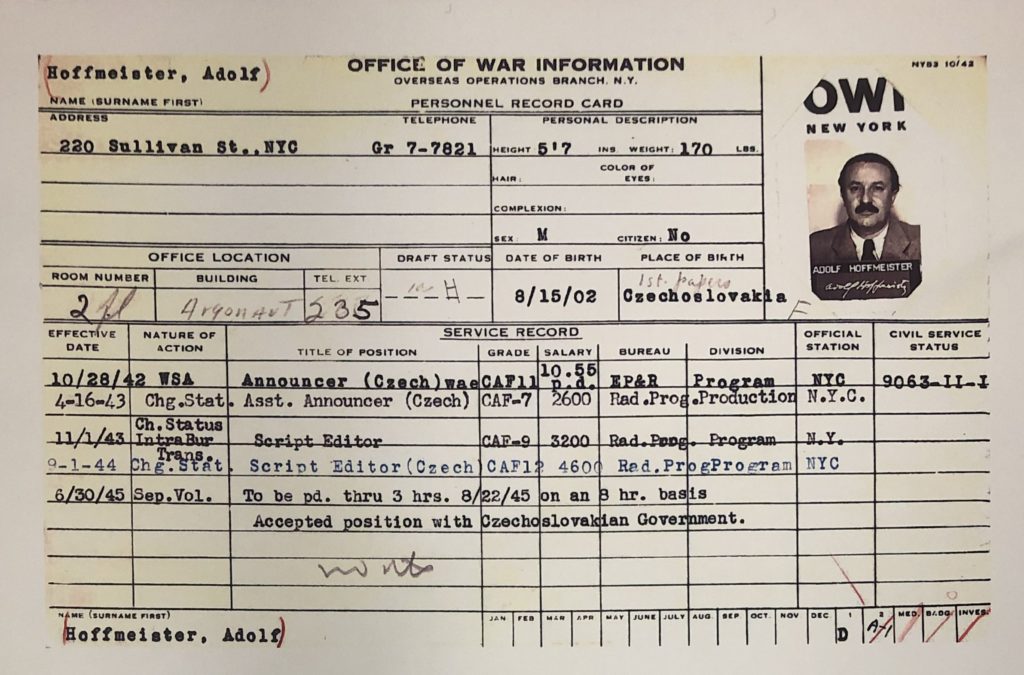
A prominent member of Mira Złotowska’s circle of radically leftist VOA journalists was a talented writer and graphic artist, Dr. Adolf Hoffmeister, who after the war served as the Czechoslovak communist regime’s ambassador to France.
A notation on Hoffmeister’s OWI personnel record card said that he had resigned on June 30, 1945 and “Accepted position with Czechoslovakian Government.”
In his resignation memorandum to the assistant chief of the Office of War Information Language Division, dated June 9, 1945, Adolf Hoffmeister noted the offer he received to work for the Czechoslovak Government in “an official capacity.” He became the regime’s ambassador to France.
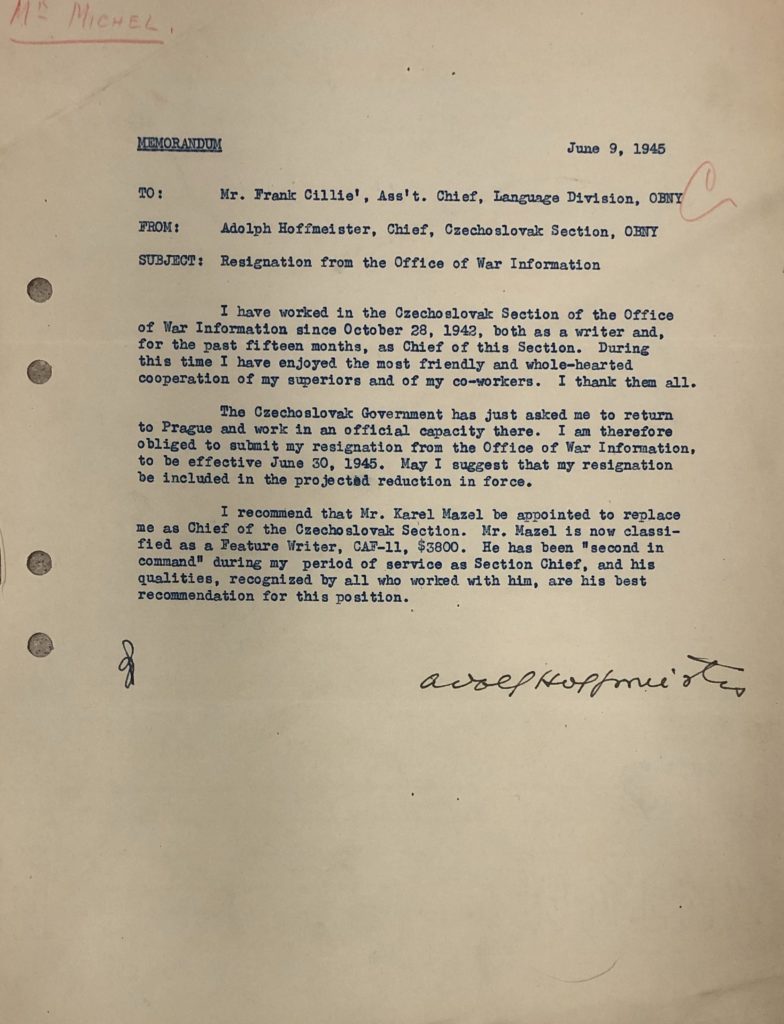
MEMORANDUM
June 9, 1945
TO: Mr. Frank Cillie, Ass’t. Chief, Language Division, OBNY
FROM: Adolf Hoffmeister, Chief, Czechoslovak Section, OBNY
SUBJECT: Resignation From the Office of War Information
I have worked in the Czechoslovak Section of the Office of War Information since October 28, 1942, both as a writer and, for the past fifteen months, as Chief of this Section. During this time I have enjoyed the most friendly and whole-hearted cooperation of my superiors and of my co-workers. I thank them all.
The Czechoslovak Government has just asked me to return to Prague and work in an official capacity there. I am therefore obliged to submit my resignation from the Office of War Information, to be effective June 30, 1945. May I suggest that my resignation be included in the projected reduction in force.
I recommend that Mr. Karel Mazel be appointed to replace me as Chief of the Czechoslovak Section. Mr. Hazel is now classified as a Feature Writer, CAF-11, $3800. He has been “second in command” during my period of service as Section Chief, and his qualities, recognized by all who worked with him, are his best recommendation for this position.
Irena Maria Balińska
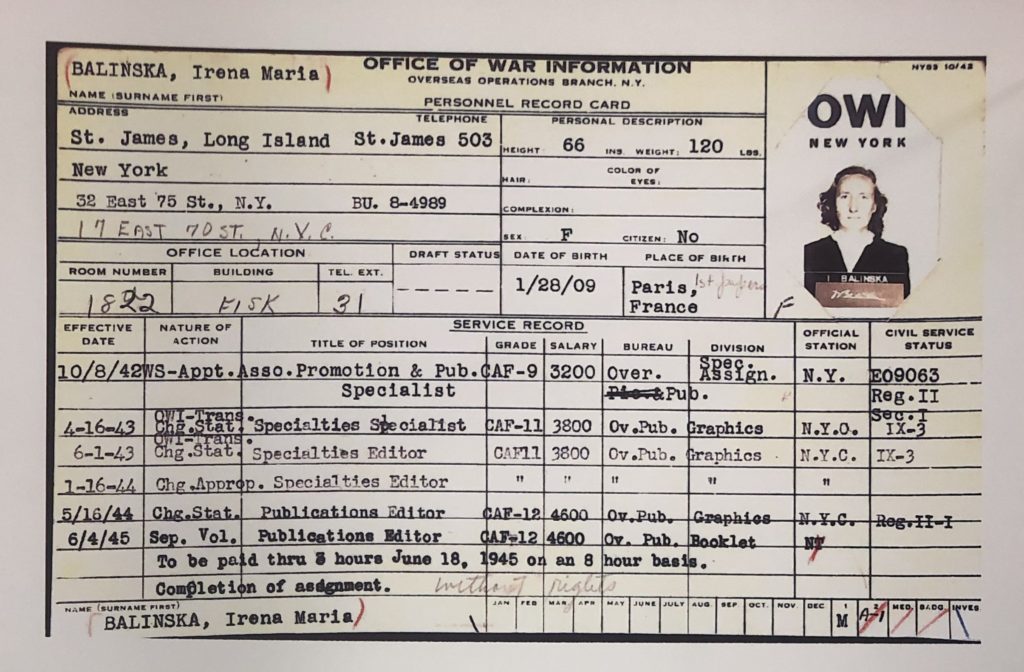
Another Polish-born journalist employed by the Office of War Information during World War II who collaborated with Stefan Arski and Mira Złotowska was Irena Maria Balińska. Her OWI personnel records do not show her working directly on Voice of America broadcasts as she is listed as being permanently in the unit producing printed propaganda. After the war, she was identified in a congressional testimony as a pro-communist regime propagandist in the United States.
Anti-Nazi Socialist propaganda pamphlet
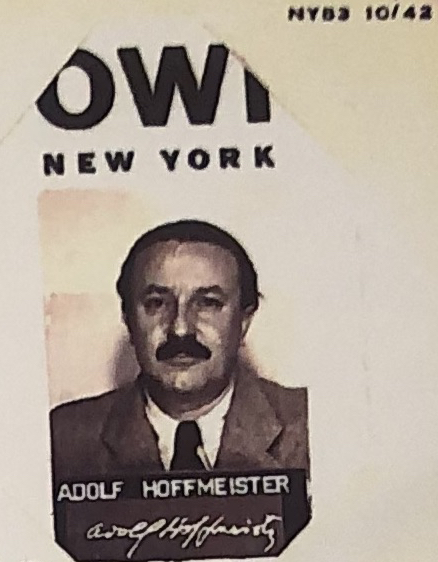
In 1943, Stefan Arski, Mira Złotowska, Adolf Hoffmeister and possibly some other OWI employees published in the United States a socialist propaganda pamphlet, written in English and illustrated by Hoffmeister, which called for establishing “People’s Poland” and imposition of “democratic control of a planned economy and industry.“ The pamphlet was not ostensibly in favor of Soviet rule and full Soviet communism. It called for “a free, independent and democratic Poland,” but it included a Marxist call for “A just distribution of the national income and work as the only title to a share of this income.”
The pamphlet also advocated “Land reform, expropriating of great landed estates and creating small sound holdings for peasants, and their inclusion in a wide network of cooperatives.” Some of these were code words for what the Soviets and communists wanted to see happen in Poland: state planned and controlled economy and Soviet style kolkhoz farms. Only the most naive journalists or fellow travelers could think that Poland would be democratic under such a program and could be independent from the Soviet Union. The pamphlet also falsely gave Polish Socialists almost all the credit for organizing anti-Nazi resistance in German-occupied Poland. It said nothing about Soviet Gulag prison work camps, the Soviet occupation of eastern Poland and arrests and forced deportations of hundreds of thousands of Poles to Siberia and Soviet Central Asia.
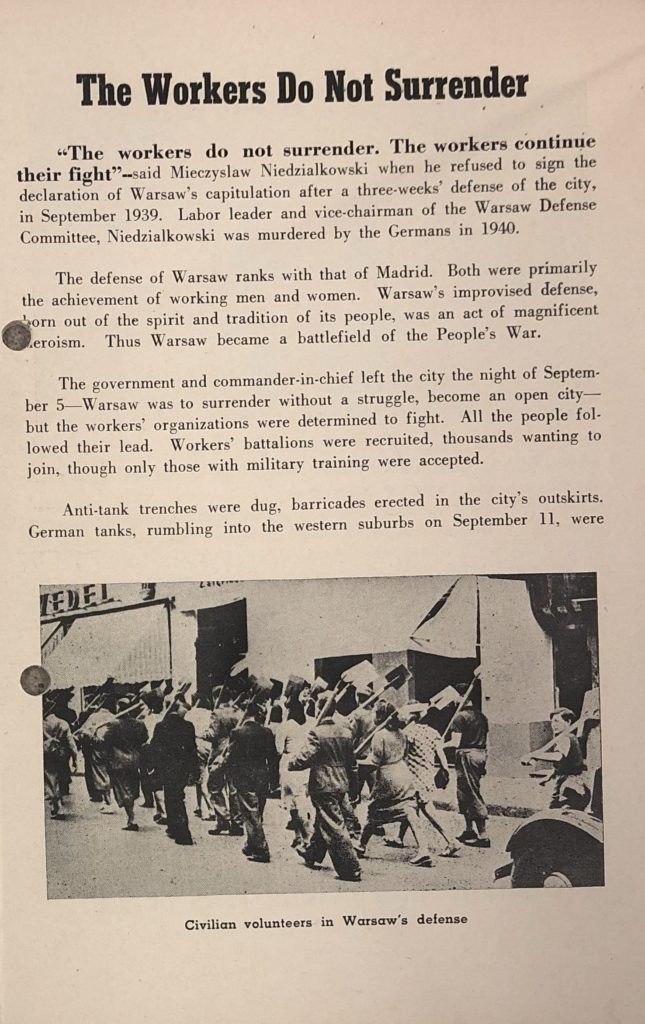
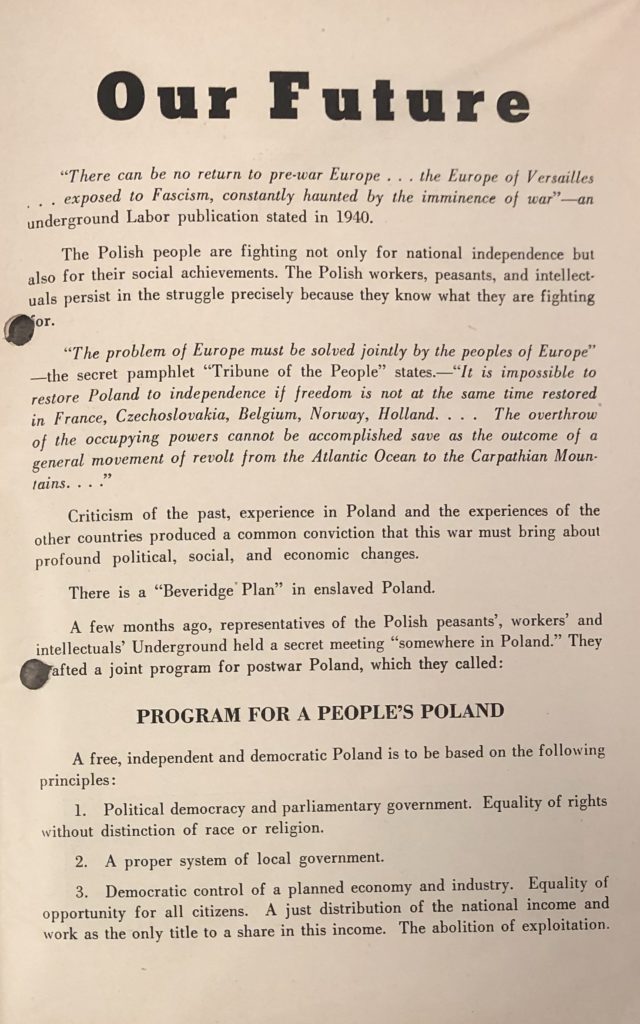
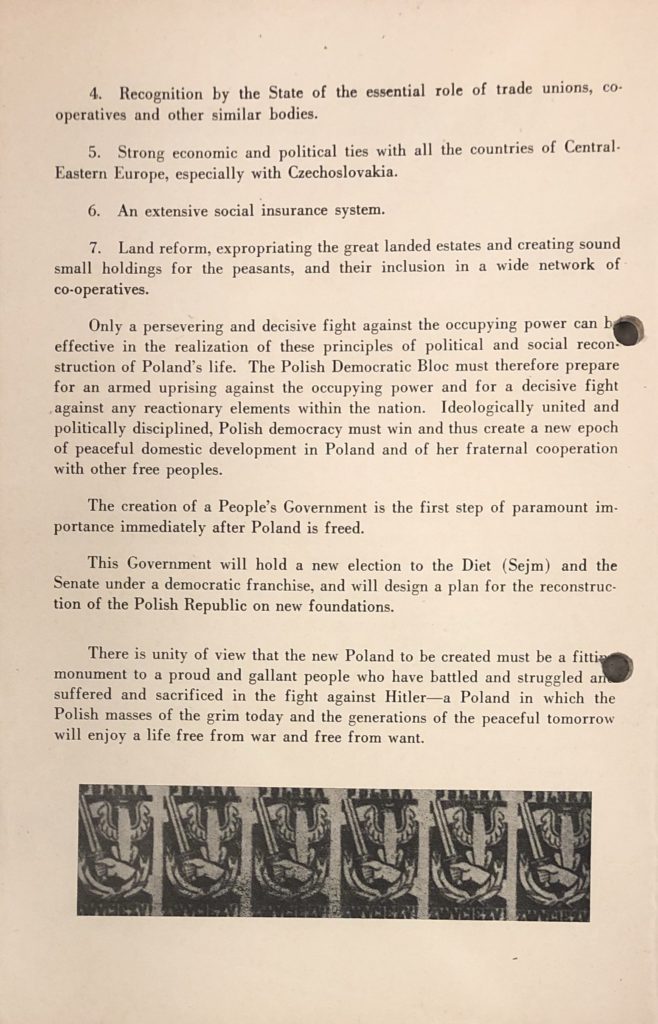
Much of the information in the pamphlet about the German occupation of Poland, illustrated by Hoffmeister and most likely written by Złotowska and Arski, was true, but most of the presented information about the Polish anti-Nazi underground army and the Polish underground state was highly misleading, with many key facts omitted or distorted to make it appear that the Poles in German-occupied Poland and Polish refugees abroad were overwhelmingly in favor of establishing a socialist government after the defeat of Germany. While the role of Soviet Russia was not emphasized by the authors, for all practical purposes it was a propaganda pamphlet that the Soviets would welcome.
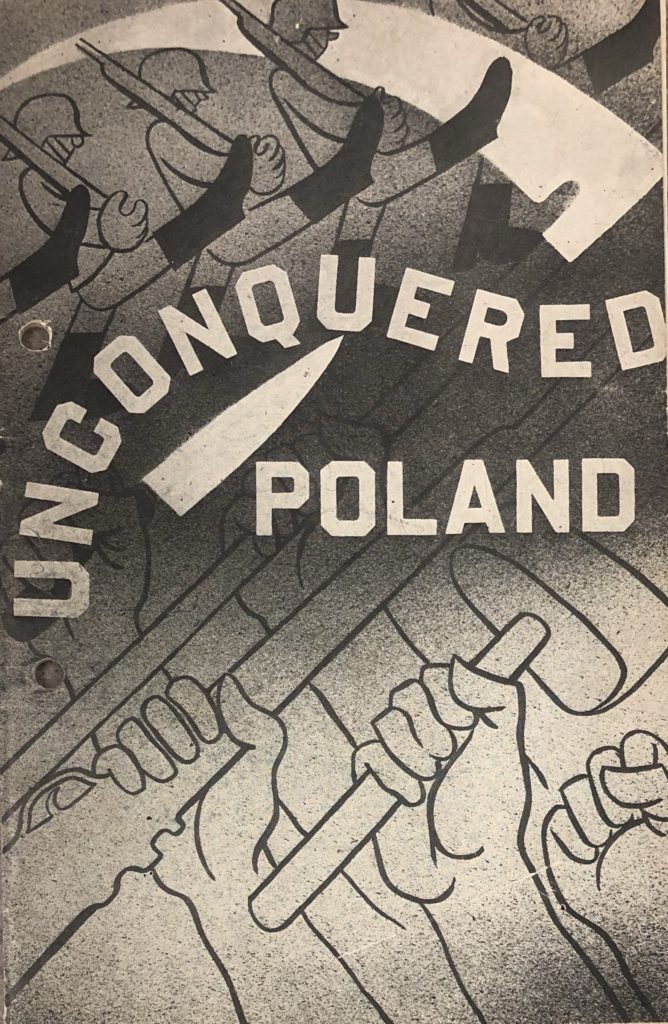
A copy of the pamphlet at the National Archives includes handwritten signatures of Mira Złotowska, Stefan Arski and Adolf Hoffmeister. A few other signatures are not legible. The signatures are on the page which includes a quote from a speech by President Franklin D. Roosevelt. The pamphlet was found in Mira Złotowska’s Office of War Information official personnel records file stored at the National Archives in St. Louis, MO.
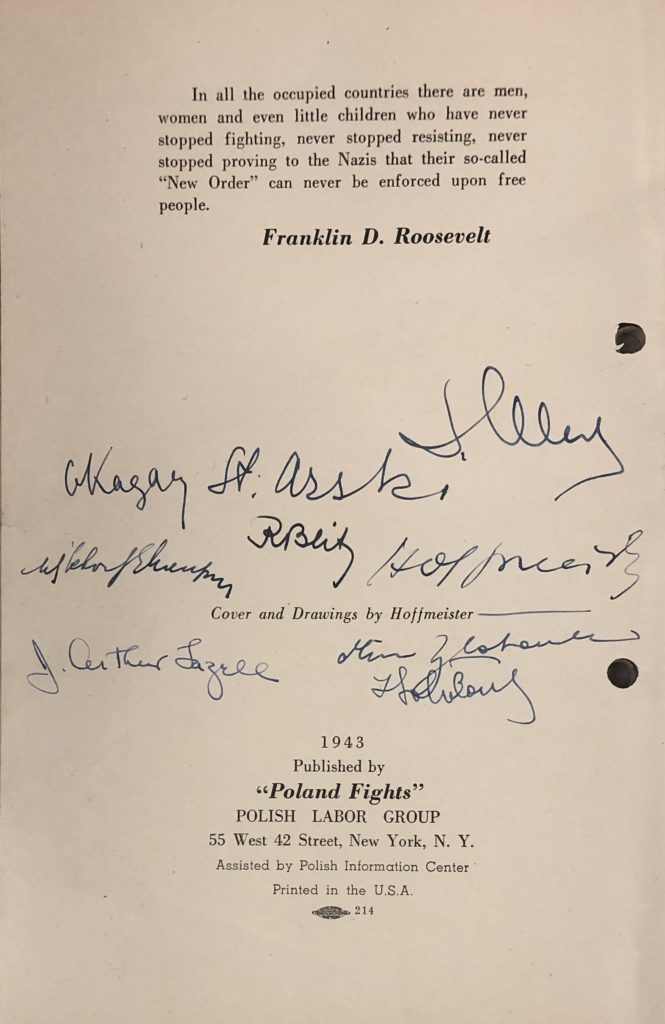
The 1943, pamphlet was officially published not by the Office of War Information but by a Polish socialist organization in New York supported by OWI. “Poland Fights” was also supported by the Polish government-in-exile in London before Arski and Złotowska declared their loyalty to the communist government in Poland backed by Soviet Russia.
Early in the war, the OWI management actually subsidized some socialist publications in the United States as part of its anti-German propaganda effort and encouraged its employees to contribute articles. Such outside activities by U.S. government employees during the war had to have prior approval from their OWI superiors, many of whom were themselves believers in socialism and strong supporters of the Soviet Union. However, Socialists and Communists never had a large following in Poland, where the largest population group were Polish Catholic farmers. Trying to convince them of the benefits of socialism and Stalin’s good will would hardly make them more willing to resist the Nazis. The vast majority of members of the Polish underground army was opposed to socialism and Russia’s influence in Poland.
But while the Soviet Union was at the time America’s most important military ally in the war against Hitler’s Germany, Roosevelt administration officials failed to foresee the long-term consequences of their propaganda strategy. The second mistake of the pro-Soviet OWI management was their failure to realize that some of their socialist-leaning employees in charge of producing Voice of America broadcasts were not Social Democrats but authoritarian Socialists who who would soon join communist governments in East-Central Europe. All the governments in East-Central Europe, which came to power with the help of the Red Army, became in reality totalitarian communist regimes taking orders from the Soviet Union. These former Voice of America journalists, who during the war expressed support for both socialism and democracy, after the war chose to support communist dictatorships. They were unwilling to admit that they had become indirect accomplices in mass repressions, torture and murder.
Early mention of Voice of America
The 1943 propaganda pamphlet in support of establishing socialist governments in East-Central Europe friendly to the Soviet Union may also be one of the first printed documents in which U.S. government’s shortwave radio broadcasts during World War II are referred to as the “Voice of America.” Voice of America did not become the official name of the these broadcasts until sometime after the war. Various names were used during and shortly after the war. “America Calling Europe” was one of the early names of VOA Polish radio programs. Mira Złotowska may have been the first one to promote the name which later was adopted as the official name of the U.S. government radio broadcasting operation, first based in New York and after 1953 in Washington, DC. In what may be another historical irony, VOA’s first chief news writer Howard Fast, a dogmatic Communist for most of his life, claimed in his book Being Red that he was the one who proposed Yankee Doodle as VOA’s signature tune, but his claim could not be confirmed. According to one description on the official Voice of America website, VOA adopted its “Yankee Doodle” station identification tune when John Chancellor was the VOA Director between 1965 and 1967 had used earlier “Columbia, Gem of the Ocean”). As a historical footnote, I should add that Fast left the Communist Party USA in 1956 or 1957 after Soviet leader Nikita Khrushchev denounced Stalin’s crimes in what was initially his secret speech to party leaders. However, Fast continued to defend Marxism and the Soviet Union for the rest of his life.
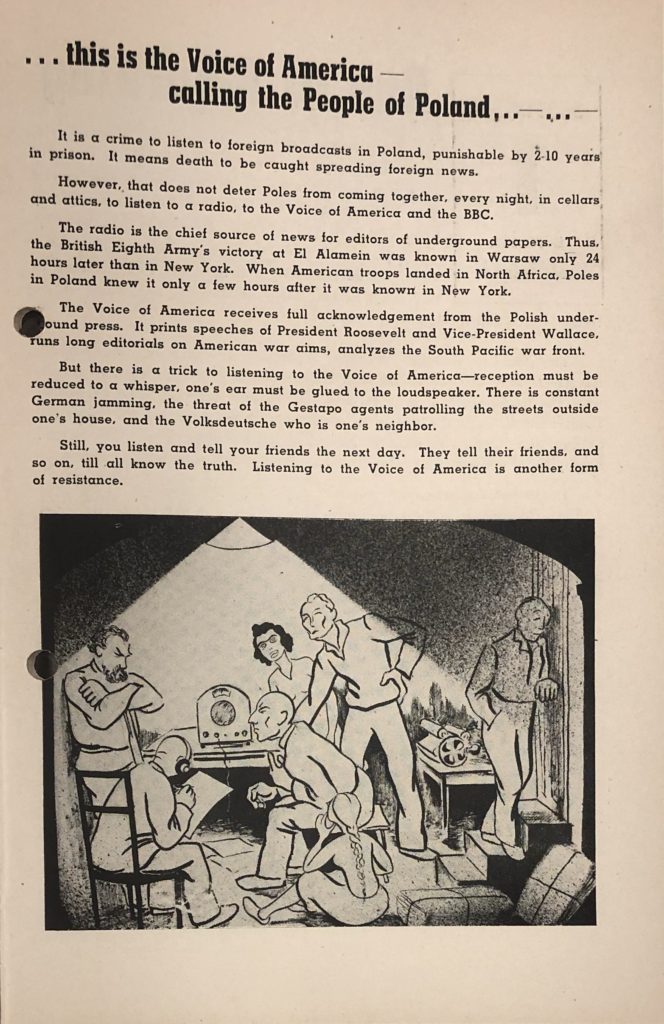
. . . this is the Voice of America —— calling the People of Poland . . .
It is a crime to listen to foreign broadcasts in Poland, punishable by 10 years in prison. It means death to be caught spreading foreign news.
However, that does not deter Poles from coming together, every night, in cellars and attics, to listen to a radio, to the Voice of America and the BBC.
The radio is the chief source of news for editors of underground papers. Thus, the British Eighth Army’s victory at El Alamein was known in Warsaw only 24 hours later than in New York. When American troops landed in North Africa, Poles in Poland knew it only a few hours after it was known in New York.
The Voice of America receives full acknowledgement from the Polish underound press. It prints speeches of President Roosevelt and Vice President Wallace, runs long editorials on American war aims, analyzes the South Pacific war front.
But there is a trick to listening to the Voice of America—reception must be reduced to a whisper, one’s ear must be glued to the loudspeaker. There is constant German jamming, the threat of the Gestapo agents patrolling the streets outside one’s house, and the Volksdeutsche who is one’s neighbor.
Still, you listen and tell your friends the next day. They tell their friends, and so on, till all know the truth. Listening to the Voice of America is another form of resistance.”
Little in this description of World War II Voice of America broadcasts was fully accurate. Very few Poles living under the German occupation had radios. They had been confiscated from the Poles by the Germans. Voice of America programs had very little information relevant to the Poles living in a Poland under German occupation. VOA would not broadcast news about Polish prisoners murdered in Soviet Russia who had families in Poland looking for them. There was also very little news in VOA broadcasts from or about Poland. The Polish underground state sent its news reports by radio to Britain, from where they were later broadcast back to Poland by the Polish radio station “Świt” and the Polish Service of the BBC.
The entire propaganda pamphlet produced by Voice of America journalists was highly misleading. The pamphlet was designed for Americans who lacked any first-hand knowledge of the Soviet regime and its atrocities. But its socialist and Marxist messages were also alien to the majority of Americans. They were even more alien to the Poles, whose country was invaded and occupied in 1939 by both Nazi Germany and Soviet Russia. Few Poles, especially those who in 1940-1941 had been deported by Stalin to the Gulag slave labor camps in Siberia, could be persuaded by such pro-socialist and pro-Soviet propaganda from journalists who also worked on Voice of America radio broadcasts to Poland.
It is true that the authors of the pamphlet did not use too many outright lies, but they omitted many critical facts and distorted others to hide the true nature of the Soviet regime. If they did not know who Stalin really was, these early VOA journalists were extremely naive. It is more likely that they did know but were blinded by their ideological zeal.
While all three authors who autographed the “Unconquered Poland” propaganda pamphlet presented themselves during the war as progressive Socialists, after the war they joined Soviet-backed communist regimes in Poland and Czechoslovakia. They did not put hundreds of thousands of political opponents in prison or condemned anti-Communists to death, but for many years they served the regimes which did commit terrific crimes and human right violations. They did not follow the path of future Polish Nobel Prize winner in literature Czesław Miłosz, who quickly grasped the murderous nature of communist totalitarian regimes. Miłosz, who in 1951 defected to the West after serving briefly the communist government as a cultural attaché in New York, Washington, DC and Paris, described in his 1953 book The Captive Mind how some leftist intellectuals were seduced by Stalin and communist propaganda to become his faithful servants and defenders of the communist order. Miłosz was never an enthusiastic defender of the regime, and he broke his ties to it rather quickly. Michałowska remained publicly loyal to the regime and continued her subtle, pro-regime propaganda in the West at least until 1971.
Adolf Hoffmeister, Mira Złotowska’s friend and colleague at the Voice of America, after first serving the new Stalinist regime in Czechoslovakia, had a falling out with the communist authorities and eventually was treated as a non-person. He left Czechoslovakia for the West after the Soviet invasion in 1968 but later returned. Beginning in 1970, his books could not be published in Czechoslovakia. He died in 1973. Mira Michałowska continued to publish in Poland in the 1970s and the 1980s, with some of her books still being adapted for television and radio productions.
Ted Lipien was Voice of America acting associate director in charge of central news programs before his retirement in 2006. In the 1970s, he worked as a broadcaster in the VOA Polish Service and was the service chief and foreign correspondent in the 1980s during Solidarity’s struggle for democracy in Poland.





